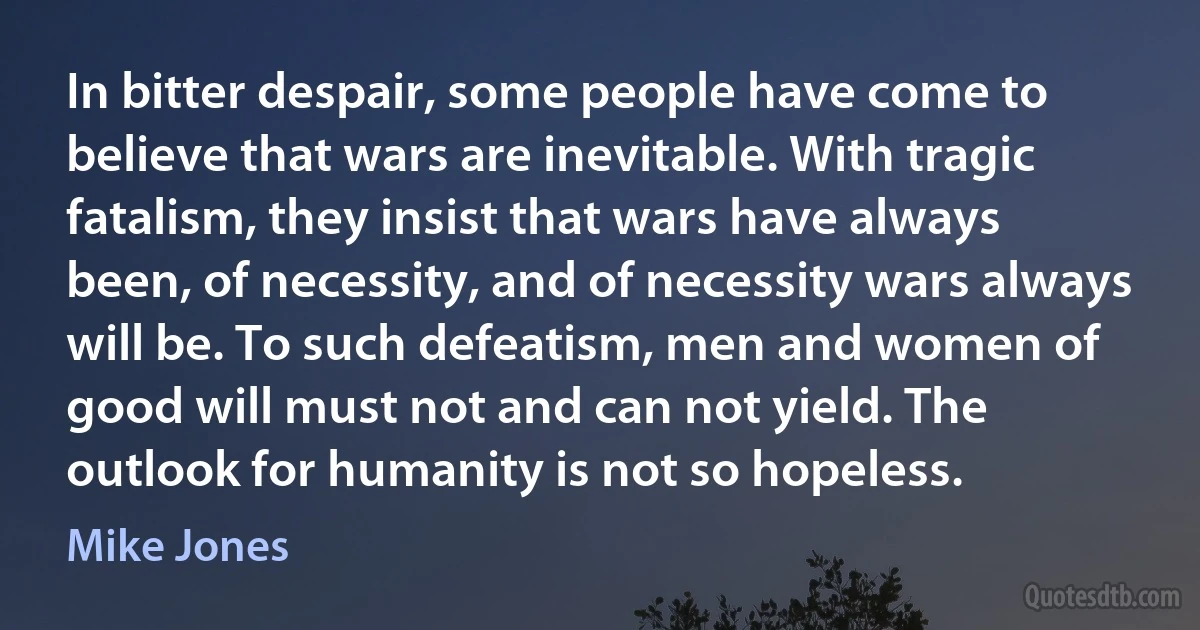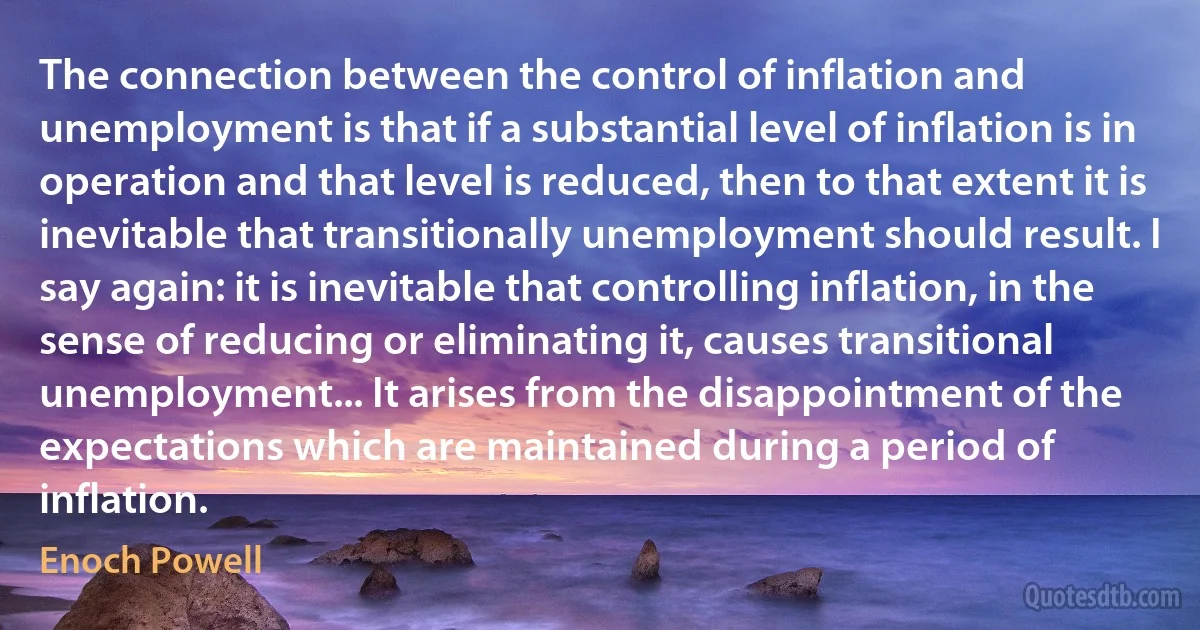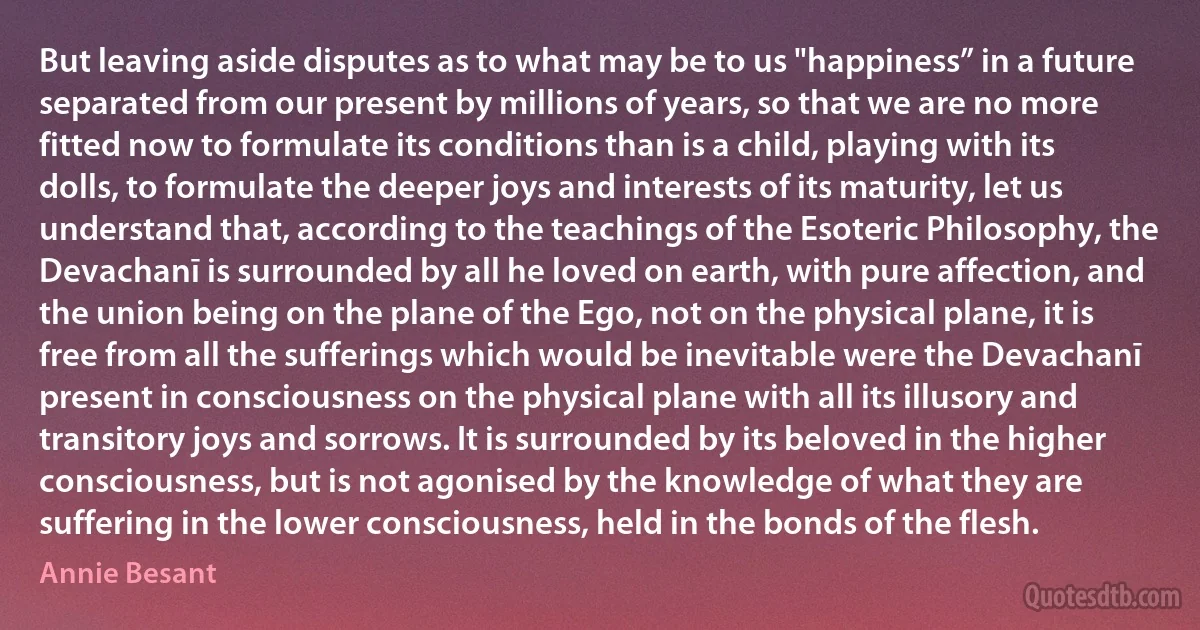Inevitable Quotes - page 33
...the whole point of studying and teaching mathematics was that it demonstrated how universal truth imposed itself upon the world-rationally, hierarchically, and inescapably. Ideally, the Jesuits believed, the truths of religion would be imposed on the world just like geometrical theorems, leaving no room for avoidance or denial by Protestant or other heretics and leading to the inevitable triumph of the Church.

Amir R. Alexander
Janis knew more than I did about "how it was", but she lacked enough armor for the inevitable hassles. She was open and spontaneous enough to get her heart trampled with a regularity that took me thirty years to experience or understand. On the various occasions when we were together, she seemed to be holding in something she thought I might not want to hear, like older people do when they hear kids they love saying with absolute youthful confidence, "Oh, that'll never happen to me." Sometimes you know you can't tell them how it is, they have to find out for themselves. Janis felt like an old soul, a wisecracking grandmother whom everybody loved to visit. When I was with her, I often felt like a part of her distant family, a young upstart relative who was still too full of her own sophistry to hear wisdom.
Did we compliment each other? Yes, but not often enough.

Grace Slick
The human mind in all countries having gone to the uttermost limit of its own capacity, flushed with its conquests, haughty after its self-assertion upon emerging from the prior dark age, is now nearing a new phase, a phase inherent in the nature and destiny of things.
The human mind, like the silk-worm oppressed with the fullness of its own accumulation, has spun about itself gradually and slowly a cocoon that at last has shut out the light of the world from which it drew the substance of its thread. But this darkness has produced the chrysalis, and we within the darkness feel the beginning of our throes. The inevitable change, after centuries upon centuries of preparation, is about to begin.

Louis Sullivan
Acknowledgement, and celebration, of mystery probably constitutes the most consistent theme of my poetry from its very beginnings. Because it is a matter of which I am conscious, it is possible, however imprecisely, to call it an intellectual position; but it is one which emphasizes the incapacity of reason alone (much though I delight in elegant logic) to comprehend experience, and considers Imagination the chief of human faculties. It must therefore be by the exercise of that faculty that one moves toward faith, and possibly by its failure that one rejects it as delusion. Poems present their testimony as circumstantial evidences, not as closing argument. Where Wallace Stevens says, "God and the imagination are one," I would say that the imagination, which synergizes intellect, emotion and instinct, is the perceptive organ through which it is possible, though not inevitable, to experience God.

Denise Levertov
It was deeply fascinating to watch how strikingly contemporary American audiences from coast to coast found Shakespeare's Othello - painfully immediate in its unfolding of evil, innocence, passion, dignity and nobility, and contemporary in its overtones of a clash of cultures, of the partial acceptance of and consequent effect upon one of a minority group. Against this background, the jealousy of the protagonist becomes more credible, the blows to his pride more understandable, the final collapse of his personal, individual world more inevitable. But beyond the personal tragedy, the terrible agony of Othello, the irretrievability of his world, the complete destruction of all his trusted and sacred values - all these suggest the shattering of a universe.

Paul Robeson
We cannot leave our topic without saying at least a word about the domestic tyranny that is the inevitable accompaniment of war. The great Randolph Bourne realized that "war is the health of the State." It is in war that the State really comes into its own: swelling in power, in number, in pride, in absolute dominion over the economy and the society. Society becomes a herd, seeking to kill its alleged enemies, rooting out and suppressing all dissent from the official war effort, happily betraying truth for the supposed public interest. Society becomes an armed camp, with the values and the morale-as Albert Jay Nock once phrased it-of an "army on the march."

Randolph Bourne
There's simultaneously something rigorous and something playful in genre. It's about the positing of something impossible-whether not-yet-possible or never-possible-and then taking that impossibility and granting it its own terms and systematicity. It's carnivalesque in its impossibility and overturning of reality, but it's rationalist in that it pretends it is real. And it's that second element which I think those who dip their toes in the SF pond so often forget. They think sf is "about” analogies, and metaphors, and so on. I refute that-I think that those are inevitable components, but it's the surrendering to the impossible, the weird, that characterizes genre. Those flirting with SF don't surrender to it; they distance themselves from it, and have a neon sub-text saying, "It's okay, this isn't really about spaceships or aliens, it's about real life,” not understanding that it can be both, and would do the latter better if it was serious about the former.

China Miéville
As the seventh century [BC] drew to a close, the bitterness of the helpless poor against the legally entrenched rich had brought Athens to the edge of revolution. Equality is unnatural; and where ability and subtlety are free, inequality must grow until it destroys itself in the indiscriminate poverty of social war; liberty and equality are not associates but enemies. The concentration of wealth begins by being inevitable, and ends by being fatal.

Will Durant
Our aim is not to do away with corporations; on the contrary, these big aggregations are an inevitable development of modern industrialism, and the effort to destroy them would be futile unless accomplished in ways that would work the utmost mischief to the entire body politic. We can do nothing of good in the way of regulating and supervising these corporations until we fix clearly in our minds that we are not attacking the corporations, but endeavoring to do away with any evil in them. We are not hostile to them; we are merely determined that they shall be so handled as to subserve the public good. We draw the line against misconduct, not against wealth.

Theodore Roosevelt
And not in the form of a "great power," the concept on which Ukrainian nationalists have placed their bets. They are acting out and trumpeting a cult of force, persistently inflating Russia into the image of an "enemy." Militant slogans are proclaimed. And the Ukrainian army is being indoctrinated with the propaganda that war with Russia is inevitable.

Aleksandr Solzhenitsyn
The alternative to escape or defeat was rebellion. And such was the situation of the labouring poor, and especially the industrial proletariat which became their nucleus, that rebellion was not merely possible, but virtually compulsory. Nothing was more inevitable in the first half of the nineteenth century than the appearance of labour and socialist movements, and indeed of mass social revolutionary unrest.

Eric Hobsbawm
Decadence, instability, disintegration, corruption, reversal of attitude, all that arises through the simple fact of one's going on existing without self-criticism, self-renewal, constant self-adaptation, without letting anything in one die, through the simple fact of gradually settling down in the vantage point one occupies, the good conscience one enjoys. Such is the permanent danger of all spiritual life. It is an inevitable deterioration which can only be overcome-and painfully at that-by a watchful mustering of strength-unless it be effortlessly vanquished by a wonderful gift of grace....Whence the necessity of paradox: or rather the perpetual flavor of paradox that truth has, when it is freshly expressed, for the man who clings to a truth when it is in the process of turning into a lie.

Henri de Lubac
The chief attraction of homosexual activity is that it does not require confidence or male identity or even face-to-face self-exposure. It can even be informed without an erection. It is thus an inviting escape for the fallen male. Nonetheless, actual homosexuality is by no means inevitable in such cases. A man can recover from his dejection, restore hos confidence, and return to full heterosexuality. This is the usual course of events. It is tragic, therefore, if the cultural ambience provides more easily for homosexuality than for recover of normal patterns. In many parts of urban America this tragedy is a way of life.

George Gilder
I came out of the Soviet Union no longer a communist, because I believed in personal freedom. Like all Americans, I took for granted the individual liberty to which I had been born. It seemed as necessary and as inevitable as the air I breathed; it seemed the natural element in which human beings lived.

Rose Wilder Lane
The Virginians are said to pride themselves upon the peculiar tenderness with which they visit the sceptre of authority on their African vassals. As all those acquainted with the character of the Virginia planters, whether American or foreigners, appear to concur in bearing testimony of their humanity, it is probable that they are entitled to the praise which they claim. But in their position, justice should be held superior to humanity; to break the chains would be more generous than to gild them; and whether we consider the interests of the master or the slave, decidedly more useful. To give liberty to a slave before he understands its value is, perhaps, rather to impose a penalty than to bestow a blessing; but it is not clear to me that the southern planters are duly exerting themselves to prepare the way for that change in the condition of their black populations which they profess to think not only desirable but inevitable.

Frances Wright
It goes without saying that a bird's death is inevitable, but a cat killing a bird does not have to juggle the same sort of values with which a man must be concerned. For now, suffice it to say that to kill for self-protection or food on your plane does not involve you in what we may call for the first time, I believe, karmic consequences. To kill for convenience . . . or for the sake of killing involves rather dire consequences, and the emotional value behind such killing is often as important as what is killed. That is, the lust [for] killing is also a matter that brings consequences, regardless of the living thing that is killed.

Robert Butts
There is enormous inertia-a tyranny of the status quo-in private and especially governmental arrangements. Only a crisis-actual or perceived-produces real change. When that crisis occurs, the actions that are taken depend on the ideas that are lying around. That, I believe, is our basic function: to develop alternatives to existing policies, to keep them alive and available until the politically impossible becomes politically inevitable.

Milton Friedman
The promise of survival beyond individual death or dispersion appeals to the most primal driving force of existence. Promises of transcendence have evolved out of the thriving desire to ward off the inevitable threat of individual death. Most systems propose a more or less perfect immortality – one where memories, hopes, desires, knowledge and even experiences survive the death of the physical body. An engagement and acceptance of this meme makes death particularly irrelevant. The upholding of the promise at the cost of individual sacrifice becomes acceptable. Individual sacrifices even become necessary in validating the promise.

Anand Gandhi
Ask almost anyone outside of academia to name famous US women of Mexican origin and you will probably hear ‘Dolores Huerta.' If the person knows our contemporary writers, maybe ‘Sandra Cisneros' and ‘Ana Castillo.' If you ask for a name from earlier times, you might get ‘Sor Juana'-the rebel nun of the 1600's. When you try to dig deeper, your companion may whimper, ‘I give up! Well...there's the Virgin of Guadalupe, she's on a lot of T-shirts. It was inevitable, then, that the need for a book like this would be recognized.

Elizabeth Martinez



